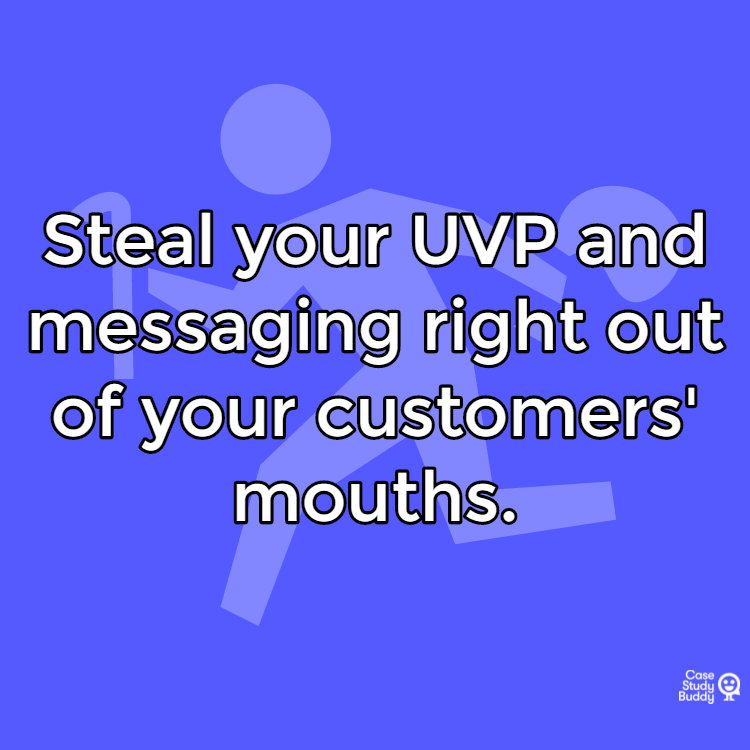Ask the right questions and a customer interview will become a goldmine of actionable intel.
One of the most common pieces of feedback we get at Case Study Buddy after sending clients a recording of our interview with their customer is, “I can’t believe how much you got out of them!”
Few clients anticipate how much we can actually help them learn on a call, but the great thing about customer interviews is that you can learn so much about a customer in such a short time.
Better yet, ask the right questions and everyone from your sales team to your copywriter will benefit from what you learn.
Here are seven things you can learn from one customer interview in 30 minutes or less – and exactly what to ask to get the information.
1. Triggers
When you understand the common events that trigger customers to look for a solution like yours, your sales team can tailor their approach, and marketing can refine messaging to speak into those scenarios.
What’s more, being able to mention a triggering event in a case study will make it possible to mirror the exact scenario a lead is in, building early rapport.
Ask your interviewee…
- “What was going on in your business when you went looking for a solution like ours?”
- “What was the most frustrating part of that situation?”
2. Customer Pain Points
Marketers talk about pain points all the time, but ask them how they actually learn and validate the pain points of their customers, and you might be met with a blank stare.
Sales people often learn these on initial calls – but checking in with happy, paying customers is a good way to see which pain points you’re actually solving.
This information is invaluable to conversion, as hearing your customers talk about their problems in their own words will equip copywriters to borrow (or steal) the language right out of your customers’ mouths to help grease the wheels and close the deal.
Ask your interviewee…
- “What were the most pressing/three biggest problems you needed our solution to solve?”
- “What other solutions did you try – and why didn’t they work for you?”
- “What does success look like in your role? What stands in the way of seeing that success?”

3. Stakeholders & Decision-Makers
Whose approval does your customer have to earn to make a purchase decision?
While you might think you have a perfect understanding of the decision-making chain of the average lead, you may be surprised to learn on a call that even when the lead themselves were 100% sold on your solution, they weren’t the one pulling the trigger.
Finding out who your customer had to impress is extremely helpful for sales and marketing alike, as this empowers you to be proactive about creating assets and resources that the lead can pass on to earn buy-in and get approval.
It will also give you a much clearer appreciation for the pressures and boundaries a lead is operating in.
Ask your interviewee…
- “What does success in your role look like – and how is that evaluated internally?”
- “Who else had to sign off on the purchase?”
- “Did you have to get buy-in from others inside the company? How did you do it?”
4. Unique Value Proposition
As a copywriter, I’m always amazed at how few businesses realize that their customers know their unique value proposition MUCH better than they do. Too often, UVPs are drafted up in some stuffy boardroom in isolation from the people who buy from you.
In an interview, you can hear straight from the customer the reasons they chose you over the competition, and use that information to improve your landing pages, website copy, marketing messaging and sales approach.
Ask your interviewee…
- “What made you confident that we were the right solution for you?”
- “Why did our solution work best for you?”
- “What didn’t you like about past solutions? How is ours different?”

5. Opportunities to Upsell (or what to build next)
Why guess at what your customer wishes you could do for them when you can just ask them?
Once you get a happy customer talking, they’re quick to share the things they wish you could do for them, or the areas they’re open to exploring down the line.
For salespeople, that’s a cha-ching moment, since it costs much more and is much more difficult to get a new customer than sell more to an existing one.
Ask your interviewee…
- “How have your needs evolved since you started using our solution?”
- “What have you been doing lately with our tool that you wish you could do better?”
- “Is there anything you wish we could do for you that we aren’t already?”
Be careful – people are terrible at predicting their future behavior – but great at telling you what they are doing now. That’s where the key insights lie.
6. Opportunities to Improve
It’s tough hearing that all’s not well – but even a happy customer likely has areas of your offering they wish you would change or get better at.
Some of the most surprising and valuable findings in our case study interviews come when we start asking for critical feedback. For example, we’ve seen SaaS companies make changes to their product or add new features on the strength of requests made from multiple clients during interviews.
Ask your interviewee…
- “Can you think of a time you were let down by our solution?”
- “What should we stop doing?”
- “What parts of our process aren’t as good as you’d like them to be?”
- “What’s the ONE thing we can improve on?”
7. Obstacles to Implementation/Barriers to ROI
The obstacles for your customers don’t end after they’ve signed on the dotted line. Oftentimes, they’ll need to jump through hoops and continue to get buy-in to make the most of your solution.
Understanding these areas of friction will empower you to assist in alleviating them – or helping your leads plan for them.
Ask your interviewee…
- “After buying our solution, what did you have to do next? What was the toughest part of that?”
- “What was the implementation phase like? What was the most difficult part of that phase?”
- “How long did it take before you were seeing the benefits of our solution? Why was that?”
…And that’s just the start!
Asking the right questions in an interview will reveal your customer’s story from start to finish – the pains that drove them, the factors that made their decision and the results they’ve achieved.
From sales and product to customer success and marketing, there’s nobody in your company who can’t learn something from talking to your clients.
Suddenly, getting a great case study out of it seems like the icing on the cake!